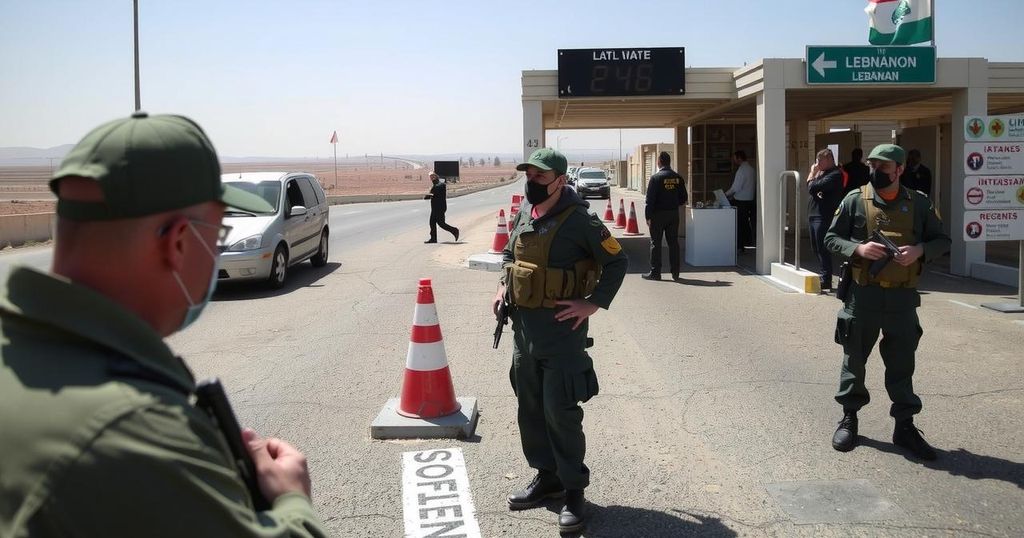Global news
ABU OMEIR, AHMAD AL SHARA, AL ASSAD, AL QAEDA, AL SHARA, ARABIAN PENINSULA, ASIA, ASSAD, BASHA, BASHAR AL ASSAD, CONFLICT, EUROPE, GAZA STRIP, GULF, HAYAT TAHRIR AL SHAM, HTS, ISIS, JORDAN, LEBANON, MIDDLE EAST, MILITARY OPERATIONS, NASIB, NORTH AMERICA, PHILIPPINES, REFUGEE CRISIS, SYRIA, THE NATIONAL, UNITED STATES
Jamal Walker
0 Comments
HTS Consolidates Control Over Syrian Border Crossings with Jordan and Lebanon
Hayat Tahrir Al Sham (HTS) has assumed control of vital border crossings with Jordan and Lebanon, potentially enhancing economic activity in Syria. The group, led by Ahmad Al Shara, has shown intentions to stabilize governance and combat smuggling operations while distancing itself from extremist ideologies. HTS’s rise follows the ousting of Assad’s regime and is met with increased vigilance from neighboring Jordan.
The extremist group Hayat Tahrir Al Sham (HTS), which played a key role in the ousting of Syrian President Bashar Al Assad, has taken control of significant border crossings with Jordan and Lebanon. Witnesses and rebel leaders informed The National that HTS is solidifying its authority within Syria. The restoration of these crossings could provide crucial economic relief by facilitating normal traffic and enhancing hard currency flow for the forthcoming Syrian government. Prior to the civil war in 2011, Syria served as a vital land bridge connecting the Arabian Peninsula to Europe and was essential for Lebanese exports to the Gulf region.
Recently, HTS has deployed personnel and armored vehicles to the Nasib border crossing with Jordan, deploying drones to monitor the region. Rebel commander Abu Omeir revealed that the group intends to streamline operations at the border, seeking to encourage Jordanian authorities to permit freer passage. Currently, the Jordanian side only allows Syrians wishing to exit the kingdom and limited trucks to cross. “We have managed to bring back some old staff and will adopt the old border procedures for now,” stated Abu Omeir.
The ascendancy of HTS marks a significant shift in control, ending over fifty years of governance by the Iran-backed Assad regime. While HTS was previously aligned with Al Qaeda, leader Ahmad Al Shara has expressed intentions to shape a more stable governing presence, distancing the group from extremist ideologies. This strategic move has triggered increased reconnaissance from Jordan, including aerial surveillance by fighter jets.
Abu Omeir asserted that HTS’s presence is aimed at combating smuggling operations that flourished under the previous regime, particularly noting the area’s role in the illicit trafficking of the drug Captagon. HTS has also expanded its operations along the border and taken control of the Jdeideh crossing into Lebanon. Reports indicate that HTS is managing the post at this crossing, which was previously a critical juncture for cross-border trade. HTS is continuing military actions against the Kurdish-led Syrian Democratic Forces (SDF), seizing additional territory in eastern Syria, while only areas managed by the SDF and isolated pockets of ISIS remain outside HTS’s influence.
The ongoing conflict in Syria has resulted in a power vacuum, leading to the rise of groups like Hayat Tahrir Al Sham. Initially affiliated with Al Qaeda, HTS has gained prominence by capitalizing on the chaos following the civil war, which began in 2011 following widespread protests against President Bashar Al Assad’s regime. The recent developments at border crossings with Jordan and Lebanon reflect HTS’s strategy to consolidate power and address significant economic challenges in Syria. The border regions have long been vital for trade and movement, and their control is pivotal in shaping both the local economy and political landscape of the country.
The takeover of key border crossings by Hayat Tahrir Al Sham signifies a substantial change in Syria’s control dynamics following the fall of Bashar Al Assad. HTS’s efforts to streamline border operations may foster economic improvement for a war-torn nation while also indicating its intent to establish a more governance-oriented regime. The international community, particularly regional powers like Jordan, is keenly observing these developments, mindful of HTS’s historical affiliations and the risk of extremism.
Original Source: www.thenationalnews.com




Post Comment